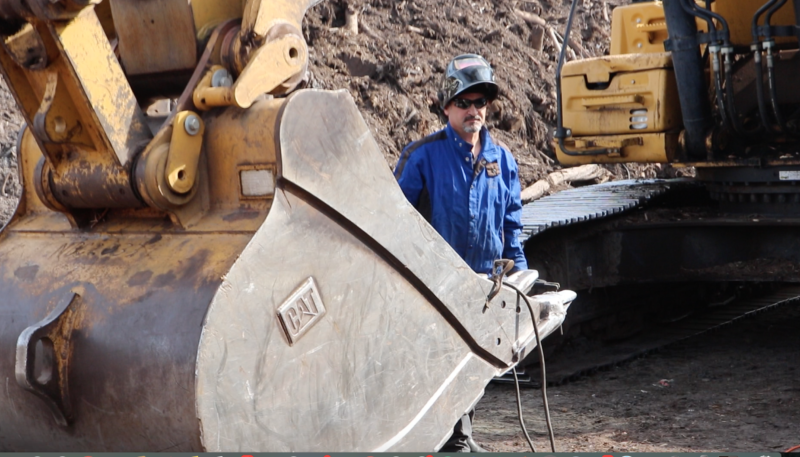FT, MYERS, FLORIDA ON-SITE DEMONSTRATION
Not everything is black and white when you are repairing Teeth on an excavator bucket. I was recently invited to advise and demonstrate weldingrods.com products at a wood recycling business. The client explained to me that the welds on teeth were cracking and wearing down. This can cause a problem, for the equipment and the company. The client explained what product was used to weld on the Excavator Teeth in the past? He explained they hire outside contractors to repair the welds, they most commonly would use 7018 welding rods.
USING 7018 WELDING RODS
Not always the best decision for every application. I realize every welder has been taught to use 7018 on just about everything that needs to be welded. On certain repair jobs, it is important to know the application of the equipment.
7018 Characteristics
As a general rule, E7018 stick electrodes are a good choice for structural steel applications due to their smooth, stable and quiet arc, and their low spatter levels.
CHOOSING THE RIGHT WELDING ROD FOR YOUR APPLICATION
It is very important to look at your surroundings and ask questions about the application. In this case, I was told the bucket teeth our wearing out, the welds our wearing out and cracking. I could immediately see what the client’s application was digging and grabbing brush and wood and the most obvious wear problem is the dust. Unless you like repairing your equipment multiple times then stop reading this article.
I explained to the client that we need to use an Electrode product to join the teeth that is very ductile that will take extreme amounts of abuse. I then explained we also need to be able to join with it and build-up. It also has to be compatible with the base metal. Finally, I said we have to add a hardface after we repair the teeth. The Hardface would be a 2- pass material to cap the build-up.
WELDINGRODS.COM PRODUCT
I recommended WR #6 for a couple of reasons, first, it has a Tensile Strength of up to 125,000 psi and 38% elongation. Next, it has work hardening properties and can be built-up. The #6 is typically used for joining and building up of wear surfaces. Most commonly used for Stone Crushers, Shovels, Railroad Frogs, Drums, Blocks, & Sleeves and all types of construction equipment.
I Also recommended using WR #9 Tubular Hardface for the final pass to protect the teeth and surrounding bucket area from wear. The number 9 is a tubular electrode with chrome carbide particles inside. By using this large diameter low heat hardface electrode it will deposit a thin wide bead of protection with less distortion.
Using the two products from Weldingrods.com will most definitely protect the excavator bucket much longer without cracking and wear problems than using 7018. I am not saying that 7018 is an inferior welding rod. It was just used in the wrong application. This is a common mistake that cost companies time and resources in the long run.
BENEFITS OF HARDFACE
Companies have a great investment not only in their equipment also in their employees. Proper care can pay off in the long term. Less downtime repairing equipment not only saves you from equipment repairs it also keeps your employees working. I was informed that the excavator bucket sides were wearing as well as the teeth and welds. It looked like it was never hardfaced on the sides or edges. In most applications, you are digging something that has high impact or abrasion that will create a problem for any bucket. The key is to identify what you are working with and choose the proper hardface for your application. There are many different types of hardface available for different applications. Hardface comes in different processes (Electrodes and Mig wire) as well. If you choose the right product for your application, it will save you costs and downtime in the future.
For product demonstrations in the Florida area contact Dave Miller @ 1-888-935-3703 Weldingrods.com website.

